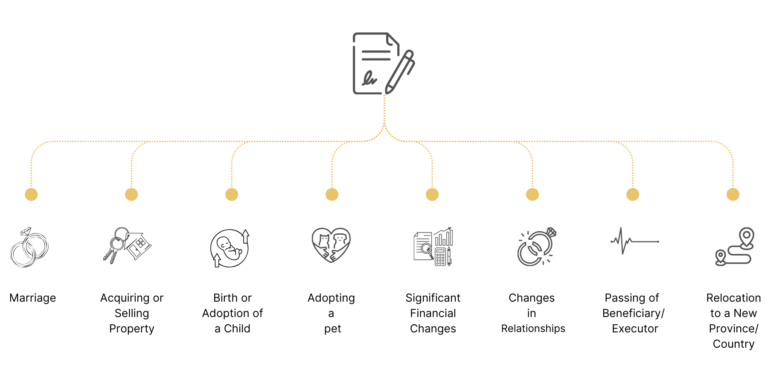Avoiding the most common mistakes in writing a Will go a long way in ensuring your assets are distributed according to your wishes after you pass away. While it can seem like a complex process, understanding some common pitfalls can help you create a clear and effective Will. Here are 7 common mistakes to avoid in a Will.
1. Failing to Consider All Your Assets (one of the most common mistakes in writing a will!)
It is important to take a comprehensive inventory of all your assets before writing your Will. This includes real estate, bank accounts, investment accounts, vehicles, and other personal belongings. You do not need to include every specific item in your Will, but having an overview of all your assets helps you leave behind specific assets for specific people if you wish to do so.
2. Unclear Language
Ambiguous language in your Will can lead to misinterpretations and even legal disputes. Use clear and concise wording when specifying who receives what. Avoid using nicknames or overly sentimental descriptions that could be open to debate.
For example, saying “I leave $5,000 to my children and the rest is to be divided among my family” may seem reasonable while speaking but is unclear in a Will. Do each of your children get an equal share of the $5,000? Who are the family members among whom you would like to distribute the rest? Ambiguity is a one of the common mistakes in writing a will and one that is hard to manage with plenty of legal jargon around Our platform can help you completely eliminate the hassle of legal jargon and writing – answer a few questions and your Will is created by us.
3. Omitting Important Details
Your Will should not only address the distribution of assets but also other important matters. Consider instructions for the care of minor children, the appointment of a guardian, or wishes regarding your funeral arrangements. For example, let’s say you have a five year old daughter. Who would you want to take care of her if you and your partner both pass away? Should you set aside some funds to ensure adequate care is provided? A comprehensive Will provides clear direction for your loved ones during a difficult time.
4. Not Thinking Beyond Today
Life can be unpredictable. Consider including alternate beneficiaries in case your primary choices are no longer around or cannot be located. You may also want to address situations where a beneficiary predeceases you or becomes incapacitated. A well-crafted Will anticipates potential challenges and ensures a smooth distribution of your estate.
5. Neglecting Updates
Life circumstances change. Marriage, divorce, the birth of children, or changes in asset ownership are all reasons to review your Will. Not updating your Will could lead to unintended heirs, outdated guardianship designations, and overlooked assets. Schedule regular reviews to ensure your Will reflects your current situation and wishes.
6. Improper Witness Selection
There are specific requirements for witnesses to your Will in Ontario. Witnesses must be 18 years old, competent, and cannot be a beneficiary or your spouse/common-law partner. Choose reliable witnesses who understand the importance of their role and will be available to sign when needed. Worried if you have the right witnesses? Check out our Wizdom page for more information.
7. Keeping your Will Hidden
While not exactly one of the common mistakes in writing a will but a common one after writing it is hiding a Will too well. A will is useless if no one can find it. Store your original will in a safe and secure location, and inform your executor of its whereabouts. Consider keeping a copy with a trusted friend or lawyer for added security.
By avoiding these common mistakes in writing a will, you can create a clear and effective Will that ensures your wishes are carried out and your loved ones are taken care of after you’re gone. Remember, a well-written Will is a thoughtful gesture that provides peace of mind and avoids unnecessary stress for your beneficiaries.













